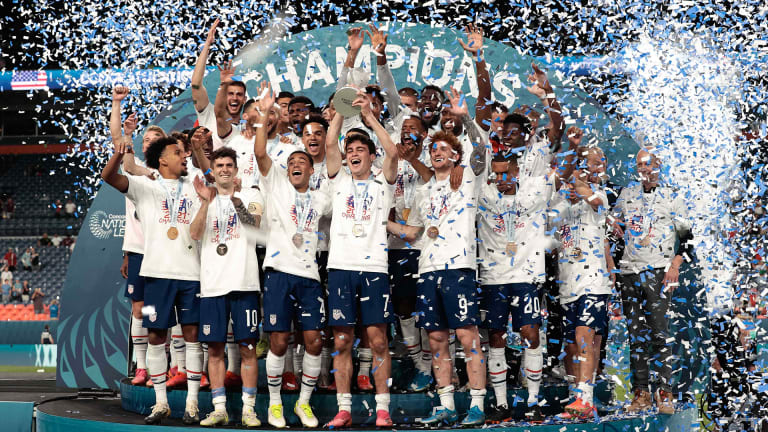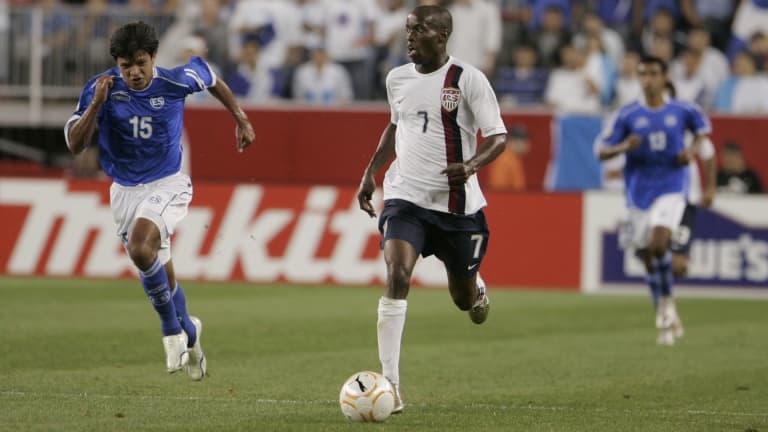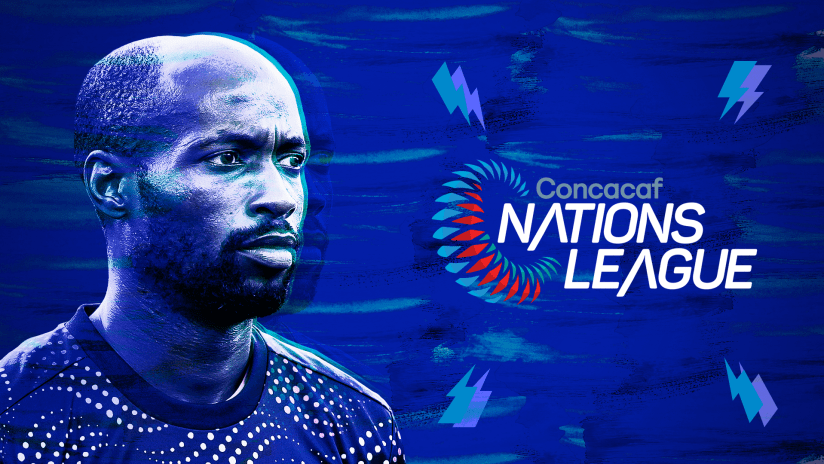The number of matches and multiple tournaments players partake in each year is always a big topic of discussion, not only for executives at FIFA or the presidents of each footballing region, but for coaches and players alike.
In a recent press conference with Belgium, Manchester City star Kevin De Bruyne offered a very honest take on the UEFA Nations League: “For me, the Nations League is not important. We have to play these games, but it feels like a campaign of friendly games. Just glorified friendlies after a long and tough season. I’m not looking forward to it.”
That perspective was echoed by his club teammate and Portugal star Bernando Silva, who offered this about a stretch where they'll play four Nations League games in 10 days: "After a season in which we've had 60 games, to come here and then have to play four more... many people have spoken about it. There are too many games, in the end, too many injuries. We start the new season in a month's time and I'm certain we are not going to be 100% ready."
I will tell you now, they're not the only ones thinking this.
If it is not a World Cup Qualifier or a major tournament, most players will have the same sentiment as Mr. De Bruyne. Now, not every player will come out and say that but, speaking from my experience of playing in Europe with a lot of other internationals, that is the reality.
After a long season, half of the time most players want to go on holiday for a few days, get away from the game and enjoy their time off. And you better believe they couldn’t be bothered with playing in a friendly match against countries ranked low or participating in newer tournaments like the Nations League.

Fatigue, motivation & an increasing number of games
I know everyone is different and the age where a player is in his respective career can be a factor in how one feels about playing international friendlies or the Nations League. We can sit here and throw different variables of why players don’t see the importance of these games, but the simple fact is this: There are too many games and fatigue becomes an issue.
It is not that players don’t want to represent their country or are not proud to do so. Not every player will play 50-60 games a year for their club and country and being able to do so is a privilege. However, the ones who have this opportunity would prefer not to play in matches where the competition isn’t as high as what they are used to.
Nowadays players have an increased number of games throughout a season, mostly due to the added international matches and bevy of competitions. It makes it basically impossible to keep the same intensity and mentality at a high level for all of them.
I remember playing in USMNT matches after a long season where we knew we were going to win. The competition was not very high, and neither was my motivation. In those situations, you do enough to get through the match because in your head you know it doesn’t mean much in the bigger scheme of things.
That said, I loved playing for my country every chance I got. The feeling of putting on your nation's colors is almost indescribable. I always felt a sense of pride as I was honored to be representing my country and to be viewed as one of the best soccer players in this country. Still, when you have been playing in so many matches in the year and then need to rustle up any energy or motivation to play these games, it is difficult.
Finding meaning in Nations League
The USMNT will start the defense of their Concacaf Nations League title on Friday against Grenada after winning the first version of the tournament against Mexico last year. I know this tournament was brought on to be a substitute for meaningless friendlies throughout the year and the hope was that adding a trophy would stop players from backing out of friendly matches. Also, the tournament serves to help the smaller nations play in more high-level matches, something I think is important for the growth of Concacaf as a whole.
However, with this being a World Cup year, does the Nations League serve a purpose? I do not think so.
Now, more than ever, we have top players in Concacaf playing at big clubs around the world. Keylor Navas (PSG), Weston McKennie (Juventus), Christian Pulisic (Chelsea), Alphonso Davies (Bayern Munich), Jesus “Tecatito” Corona (Sevilla), Hirving Lozano (Napoli)… I mean, the list goes on and on.
Do I think this type of top-level player will take the tournament seriously? Maybe to a certain extent, but not for long. We have seen it before with the Concacaf Gold Cup when the USMNT, Mexico, Canada and Costa Rica, arguably the top four teams in Concacaf, do not always bring their “A” team.
I have never played in the Concacaf Nations League, so I can only compare it to the Gold Cup. And in these matches, the motivation wasn’t always high. Obviously when you get to the final you want to win it, but it is true the vibe and atmosphere in camp are very different when playing in a Gold Cup than when preparing for a World Cup Qualifier.

During a World Cup Qualifying window, everyone has the same mentality, the same mindset. It was easy to be self-motivated in matches of this magnitude. When you came into camp, the atmosphere is relaxed and a bit tense at the same time. And that is a good thing. The level of concentration and focus needed to play those types of matches were through the roof. You didn’t need to worry about players being checked out or less motivated to be in camp. Everyone wanted to go to the World Cup, and more importantly, everyone wanted to be a contributing asset on the field.
I don’t think the same can be said about the Gold Cup or the Nations League.
A lot of times, not every time, players who came into camp had different agendas and mixed emotions. Some wanted to be there, and some didn’t. There were players who took it seriously because this was their chance to prove themselves on the international stage and others, more “seasoned,” who were there just after a long season and were too relaxed. When you add 40-50 international games under your belt, mixed with playing against low-ranked teams, your mindset is already thinking about vacation.
And I will be honest: I did both. There was a time that I took matches like the Gold Cup seriously and other times when my motivation didn’t really come until we reached the final of the tournament. But I will say the professionalism of our group was always there. Did we have that driving force needed in every single match? No, but we always tried to win our matches and bring home a trophy.
In 2003, our motivation level needed to play in a Gold Cup wasn’t there. A lot of players were held over from the Confederations Cup in France to play in the Gold Cup that summer. Others were allowed to head back to their respective clubs. Not everyone had the same goal in mind that camp, including myself. Some were on vacation; some didn’t even want to be there, and yes, others wanted to show their worth. You can say it is easy to pick out that year because we didn’t reach the final, but ask anyone who was a part of that group that summer. These matches were viewed as “glorified friendlies”.
Playing for your country is a privilege. It is earned, not given. I loved playing for my country, and I know players who get the opportunity love playing for their country. So, when players voice their concerns about why they see these games as non-important or “glorified friendlies,” it is not because of a lack of passion or love for their flag. It is simply because they are exhausted.










